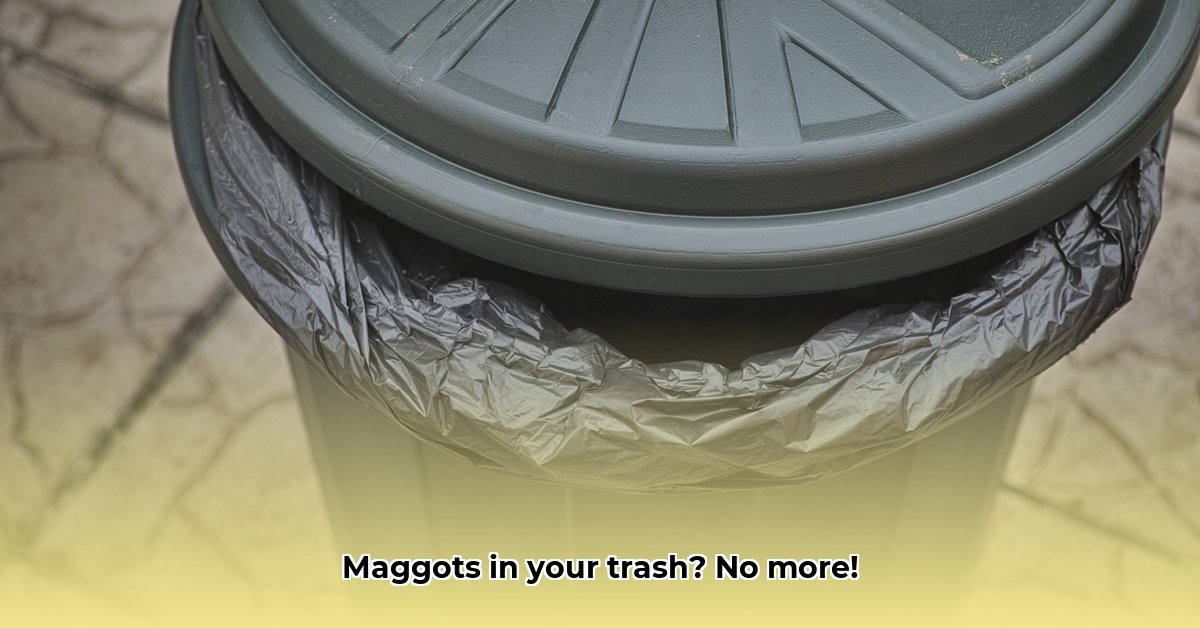Dealing with maggots in your trash can is a common problem, but thankfully, one that’s easily preventable. This comprehensive guide provides practical strategies and helpful tips to keep your trash can clean, fresh, and maggot-free.
Winning the War Against Maggots: Understanding the Basics
Before we dive into solutions, let’s understand the enemy. Maggots are fly larvae, primarily from houseflies and blowflies, drawn to decaying organic matter. These flies treat your trash as a breeding ground, laying eggs that quickly hatch into maggots. Breaking this cycle involves targeting both the flies and their food source.
Choosing the Right Trash Can Arsenal
Your trash can itself is your first line of defense. A well-chosen can can make all the difference.
The Ideal Trash Can: Features to Look For
Opt for a durable, well-sealed container made of metal or heavy-duty plastic (look for the #5 recycling symbol). The lid should fit tightly, preventing fly access. Consider cans with odor-resistant materials or compartments for food waste, which can be especially beneficial in warmer climates.
Durable Trash Bags: Don’t Skimp on Quality
Invest in heavy-duty trash bags designed to contain odors and resist punctures. This simple step can significantly reduce leaks and deny flies easy access to the feast inside.
Maintaining a Maggot-Free Fortress: Cleaning and Sanitation
Regular cleaning is paramount. Just like you wouldn’t let dirty dishes pile up, your trash can needs attention.
Regular Cleaning Routine
Aim for a thorough cleaning every two to three weeks, or more often during warmer months. Hot, soapy water usually does the trick. Adding white vinegar or a diluted bleach solution provides extra cleaning power and disinfects the bin.
Quick Clean-Ups
Even a quick rinse after each emptying can make a difference, removing small food particles that attract flies.
Cutting Off the Food Supply: Smart Waste Management
How you manage your waste plays a crucial role in maggot prevention.
Dealing with Food Scraps
- Meat and Bones: Double bag these items and consider freezing them until garbage day. If you compost, check local guidelines for handling meat and bone scraps.
- Fruits and Vegetables: Securely bag these as well, and rinse containers before discarding them.
- Pet Waste/Deceased Animals: These should never go in your regular trash. Contact your local waste management services for proper disposal.
Prompt Disposal
Don’t let your trash become a breeding ground. Empty it frequently, especially in warmer months.
Proper Food Storage
Store food in airtight containers and wipe up spills immediately to avoid attracting flies in the first place.
Natural Repellents: Eco-Friendly Fly Control
Deter flies without harsh chemicals using nature’s own solutions.
Herbal Remedies
Certain herbs, like basil, oregano, lavender, and evergreen clippings, act as natural fly repellents. Place them in the trash bag or around the rim of the can. However, be mindful that decaying plants could attract other pests, so monitor the situation.
Diatomaceous Earth
Sprinkling food-grade diatomaceous earth in the bottom of your trash can might dehydrate insects. While it’s often recommended for other pests, its efficacy in trash cans may be limited, especially if moisture is present.
Vinegar Spray
A vinegar and water solution (one part vinegar to two parts water) can be sprayed inside the can to deter flies and neutralize odors.
Emergency Response: Dealing with an Infestation
If you discover maggots, don’t panic.
Effective Solutions
- Boiling Water: Pouring boiling water directly onto the maggots is a quick solution, but be cautious as it can damage some plastic cans.
- Freezing: Bag the infested trash tightly and freeze it overnight to kill the maggots.
- Vinegar Spray: Spray the maggots directly with the vinegar and water solution mentioned earlier.
- Commercial Insecticides: Consider these as a last resort, following product instructions carefully and being mindful of environmental impact.
| Method | Effectiveness | Speed | Eco-Friendliness |
|---|---|---|---|
| Boiling Water | Very High | Instant | High |
| Freezing | Very High | Slow | High |
| Vinegar Spray | Moderate | Moderate | High |
| Commercial Insecticides | High | Moderate | Low |
Long-Term Strategies: Prevention is Key
The most effective approach to maggot control is prevention. By consistently implementing these strategies—choosing the right trash can, maintaining cleanliness, managing waste effectively, and utilizing natural repellents—you can create a sustainable solution for a maggot-free home.
Advanced Techniques and Considerations
While the methods discussed above are generally effective, pest control is a constantly evolving field. Ongoing research explores new techniques and understandings, so staying informed about the latest advancements can be beneficial.
Composting: A Sustainable Solution
Composting food scraps is an excellent long-term strategy. It diverts organic waste from your trash, reducing fly attraction and creating nutrient-rich soil for your garden. Use a separate, sealed compost container designed for this purpose.
Environmental Factors and Fly Behavior
Fly behavior can be influenced by various environmental factors, including temperature, humidity, and the availability of food sources. Understanding these factors can help you tailor your prevention strategies for optimal effectiveness.
Experimentation and Adaptation
What works best for you may depend on your specific circumstances and environment. Don’t hesitate to experiment with different methods and adapt them to your needs. Regular monitoring and adjustments will help you stay ahead of potential infestations.
By combining these strategies, you can take control of your kitchen and banish trash can maggots for good. Remember, a clean, well-maintained trash can is essential for a healthy and comfortable home.
- Leak-Proof Glass Food Containers with Locking Lids Keep Food Fresh - February 3, 2026
- Glass Storage Containers With Glass Lids That Lock for Freshness - February 2, 2026
- Locking Glass Food Storage Containers for Organized and Fresh Meals - February 1, 2026










